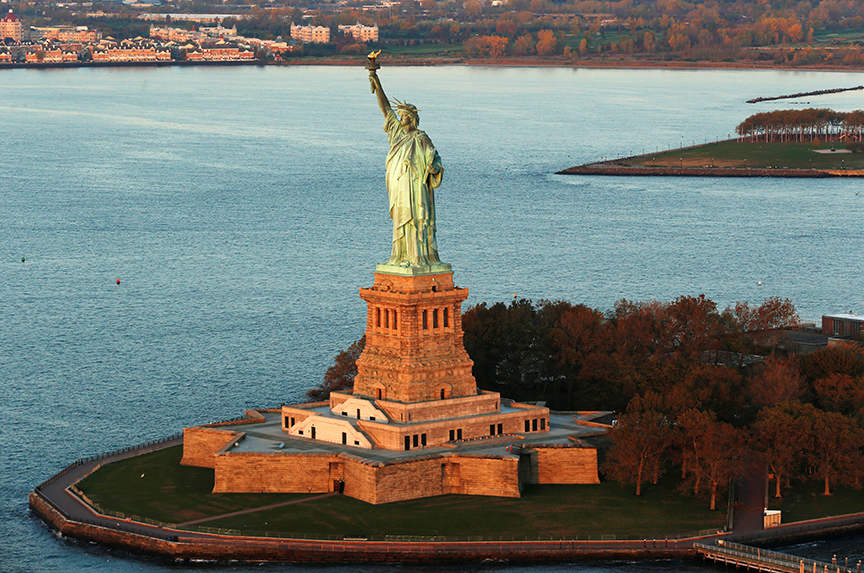 White House senior policy adviser Stephen Miller was right in one part of his polemic with CNN’s Jim Acosta on August 2: the Statue of Liberty was not, in its origins, a celebration of immigration. But the statue’s meaning, its original intent so to speak, will not advance Miller’s or anyone’s nativist agenda.
White House senior policy adviser Stephen Miller was right in one part of his polemic with CNN’s Jim Acosta on August 2: the Statue of Liberty was not, in its origins, a celebration of immigration. But the statue’s meaning, its original intent so to speak, will not advance Miller’s or anyone’s nativist agenda.
For Edouard de Laboulaye, the French abolitionist and liberal who conceived of the statue in 1865, and for many progressive Europeans of that era, the United States was a great democratic experiment in a time of few such republics, and potentially a model for his own country, then ruled by the second-rate tyrant Napoleon III. But liberals like de Laboulaye were also aware of the warning of the ancient philosophers about the fate of republics: they were apt to succumb to either chaos or tyranny. Such seemed to be the fate of the United States during the Civil War, with its shocking casualties and widespread internal dissent within the Union.
But the United States neither degenerated into tyranny nor collapsed. It held a free and hotly-contested presidential election during some of the war’s toughest fighting. The next year the United States defeated the slave republic of the Confederacy. And it did so not simply to restore the old Union, with the states as they were and slaves as they were. President Lincoln ran for office in 1860 demanding no more than the limitation of slavery, as an evil reality in the South which must be reluctantly tolerated. But in the course of the Civil War, Lincoln’s war aims expanded: so much blood and suffering could not simply result in return to the status quo. Lincoln elevated the nation’s war aims from mere restoration of the old white man’s republic to a new birth of freedom, of a nation “dedicated to the proposition that all men were created equal.”
This is what de Laboulaye sought to celebrate in his great monument to liberty: the American republic had simultaneously survived insurrection and ended slavery, its greatest birth defect. The Statue of Liberty is a monument to the new nation which emerged from America’s most terrible war. The failure of reconstruction, the imposition of Jim Crow segregation, and long and unfinished struggle to realize in practice the proposition that all are created equal, does not negate the nobility and power of this achievement.
And immigration? We can turn to Lincoln as well. In a speech given just after July 4, 1858, Lincoln speaks of the justifiable pride felt by the descendants of the generation of 1776. But then he observes that “We have… among us perhaps half our people who are not descendants at all of these men. If they look back through this history to trace their connection with those days by blood, they find that they have none, they cannot carry themselves back into that glorious epoch and make themselves feel that they are part of us, but when they look through that old Declaration of Independence they find that those old men say that ‘We hold these truths to be self-evident, that all men are created equal,’ and then they feel… that they have a right to claim it as though they were blood of the blood, and flesh of the flesh of the men who wrote that Declaration, and so they are.”
Lincoln taught that our nation is based on an idea that, when embraced, makes us Americans.
Lady Liberty holds up her torch in the name of this nation, with the slave’s broken chains at her feet. The statue was not directly about immigrants. But it is the nation which Lincoln articulated and she celebrates —not an ethno-state, but a new nation dedicated to the proposition that all men are created equal— which could invite millions of immigrants and make them Americans, blood of the blood and flesh of the flesh of the men who wrote the Declaration of Independence.
Immigration policy is complex. Criteria for admission, security measures, numbers, English language before or after admission, are all subjects for public policy debates. But as Americans debate it, let us remember who we are: an exceptional if still-flawed nation, the one Lincoln made, the one de Laboulaye held as an inspiration, and the one which the Statute of Liberty celebrates.
Daniel Fried is a distinguished fellow at the Atlantic Council. In the course of his forty-year Foreign Service career, Fried played a key role in designing and implementing American policy in Europe after the fall of the Soviet Union.
Image: The sun lights the Statue of Liberty in New York on November 2, 2016. (Reuters/Lucas Jackson)
